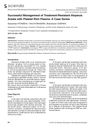 32 citations,
July 2011 in “Facial Plastic Surgery”
32 citations,
July 2011 in “Facial Plastic Surgery” New hair transplant methods offer more natural results and better graft survival, with ongoing research to increase donor hair options.
May 2023 in “Clinical, Cosmetic and Investigational Dermatology” More personalized and effective treatments for androgenetic alopecia are needed.
 2 citations,
October 2022 in “Journal of Biomedical Science”
2 citations,
October 2022 in “Journal of Biomedical Science” Stem cells and their secretions could potentially treat stress-induced hair loss, but more human trials are needed.
 December 2022 in “Journal of Dermatology Research”
December 2022 in “Journal of Dermatology Research” Platelet Rich Plasma (PRP) treatment significantly improved Female Pattern Hair Loss in a study, but more trials are needed for confirmation.
 49 citations,
August 2016 in “Aesthetic Surgery Journal”
49 citations,
August 2016 in “Aesthetic Surgery Journal” Micro-needling effectively improves wrinkles, scars, and hair growth, but proper technique and safety are important.
 27 citations,
September 2018 in “Nanomedicine: Nanotechnology, Biology and Medicine”
27 citations,
September 2018 in “Nanomedicine: Nanotechnology, Biology and Medicine” Further research is needed to improve hair regeneration using stem cells and nanomaterials.
 13 citations,
September 2010 in “Journal of Dermatological Science”
13 citations,
September 2010 in “Journal of Dermatological Science” Researchers made a cell line that grows quickly and can help with hair growth research.
 12 citations,
December 2009 in “Amino Acids”
12 citations,
December 2009 in “Amino Acids” Putting α-methylspermidine on mouse skin can start hair growth.
 234 citations,
September 2004 in “Clinical cancer research”
234 citations,
September 2004 in “Clinical cancer research” BAY 43-9006 helps control kidney cancer growth but doesn't significantly increase overall survival.
 August 2023 in “Stem Cell Research & Therapy”
August 2023 in “Stem Cell Research & Therapy” A substance called Cell-free fat extract can effectively treat common hair loss by increasing hair growth and density.
 46 citations,
February 2012 in “Oncology Reports”
46 citations,
February 2012 in “Oncology Reports” Sorafenib helps some advanced cancers alone or with other treatments, but not all, and research continues to improve its use.
8 citations,
January 2016 in “Cells tissues organs” Norepinephrine helps skin cells grow, which is important for hair growth.
 27 citations,
August 2005 in “The journal of investigative dermatology/Journal of investigative dermatology”
27 citations,
August 2005 in “The journal of investigative dermatology/Journal of investigative dermatology” Researchers found new genes involved in hair growth, which could help develop new hair treatments.
 1 citations,
September 2022 in “Journal of dermatological science”
1 citations,
September 2022 in “Journal of dermatological science” Certain vitamins and their derivatives can help hair grow longer by activating specific growth signals.
 November 2024 in “Deleted Journal”
November 2024 in “Deleted Journal” Platelet-rich plasma injections can help treat hair loss in lupus patients.
 222 citations,
August 2009 in “Experimental Dermatology”
222 citations,
August 2009 in “Experimental Dermatology” Stem cells are crucial for wound healing and understanding their role could lead to new treatments, but more research is needed to answer unresolved questions.
 99 citations,
July 2017 in “Clinical Reviews in Allergy & Immunology”
99 citations,
July 2017 in “Clinical Reviews in Allergy & Immunology” New treatments for Alopecia Areata show promise but need to be more effective and affordable.
 March 2024 in “Frontiers in genetics”
March 2024 in “Frontiers in genetics” Different types of fibroblasts play specific roles in wound healing and cancer, which could help improve treatments.
 February 2024 in “Plastic and Reconstructive Surgery – Global Open”
February 2024 in “Plastic and Reconstructive Surgery – Global Open” Stem cell therapies show promise for hair regrowth in androgenetic alopecia.
 June 2023 in “International journal of science and research”
June 2023 in “International journal of science and research” PRP injections help hair regrowth safely but may need more research.
 19 citations,
June 2019 in “Clinical Drug Investigation”
19 citations,
June 2019 in “Clinical Drug Investigation” Platelet-rich plasma injections significantly improve hair density and thickness in both male and female pattern hair loss, especially in early stages.
 2 citations,
June 2019 in “Serbian Journal of Dermatology and Venereology/Serbian Journal of Dermatology and Venerology”
2 citations,
June 2019 in “Serbian Journal of Dermatology and Venereology/Serbian Journal of Dermatology and Venerology” Platelet-rich plasma injections can effectively treat stubborn alopecia areata.
 46 citations,
May 2018 in “Dermatologic Surgery”
46 citations,
May 2018 in “Dermatologic Surgery” PRP injections effectively treat hair loss, with positive results in both monthly and every three months treatments.
 January 2014 in “Cosmoderma”
January 2014 in “Cosmoderma” The document concludes that personalized treatment plans for hair loss in Asian men are necessary and more research is needed to develop effective guidelines.
 2 citations,
January 2021 in “Journal of Cosmetics, Dermatological Sciences and Applications”
2 citations,
January 2021 in “Journal of Cosmetics, Dermatological Sciences and Applications” Olive Mill Wastewater extract could potentially improve hair growth and prevent hair loss.
 25 citations,
December 2021 in “Stem Cell Research & Therapy”
25 citations,
December 2021 in “Stem Cell Research & Therapy” MSCs and their exosomes may speed up skin wound healing but need more research for consistent use.
 June 2024 in “Stem cell research & therapy”
June 2024 in “Stem cell research & therapy” Regenerative medicine shows promise for treating skin disorders like hair loss and vitiligo.
 56 citations,
January 2021 in “Clinical and Experimental Medicine”
56 citations,
January 2021 in “Clinical and Experimental Medicine” The document concludes that while there are various treatments for Alopecia Areata, there is no cure, and individualized treatment plans are essential due to varying effectiveness.
 August 2024 in “Journal of Cosmetic Dermatology”
August 2024 in “Journal of Cosmetic Dermatology” Injectable treatments can effectively and safely improve hair growth in adults with androgenetic alopecia.
January 2023 in “Journal of Cosmetic Dermatology” PRP is effective for treating hair loss, improving hair density, count, and thickness.



























